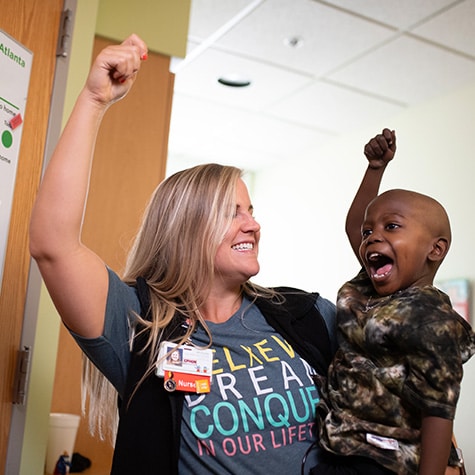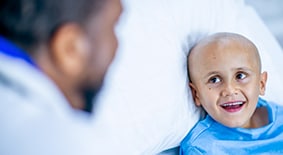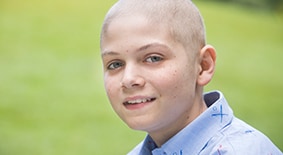Giving Caroline a Fighting Chance Against Pediatric Brain Cancer
Diagnosed at age 3 with a pediatric brain cancer called anaplastic ependymoma, Caroline continues to undergo treatment and is fighting for a full recovery with her care team by her side.

The day before her surgery, 3-year-old Caroline was cheerfully running down the halls of the Aflac Cancer and Blood Disorders Center of Children’s Healthcare of Atlanta. Her parents, Jamie and Matthew, delighted in seeing her so happy, but watching Caroline laugh and play was heart-wrenching because they knew there was a chance she may not be the same after surgery.
Caroline had brain cancer and a softball-size tumor nestled at the base of her brain. The official diagnosis was anaplastic ependymoma. Her neurosurgeon, Andrew Reisner, MD, was hopeful but said that if she survived surgery, she would likely be paralyzed on her left side, and the ophthalmologist predicted she would be blind.
Beyond expectations
During Caroline’s eight-hour surgery, Jamie and Matthew prepared for the worst. But when the surgery was over, to their amazement, Caroline was sitting upright in bed and smiling. She was not blind or paralyzed. The neurosurgeon was able to remove the large tumor from her brain. And she walked out of the hospital seven days later.
Since her initial diagnosis, Caroline has battled two more tumors, undergoing radiation, chemotherapy, physical therapy, occupational therapy and additional neurosurgeries to remove them. During her most recent MRI, another tumor was found, but her family remains hopeful and focused on a cancer-free future. With a dedicated, comprehensive care team in Caroline’s corner, she continues to be as strong and brave and resilient as ever, and her family knows she’s in good hands.

One of the largest centers for pediatric brain cancer in the U.S.
No parent wants to hear the words “brain cancer”—but with the Children’s team by their side, patients and families can rest assured that they are receiving the full spectrum of advanced therapies available to treat these complex diseases.
See HowMaking a Difference for Kids With Cancer
Contact Us 404-785-1112


